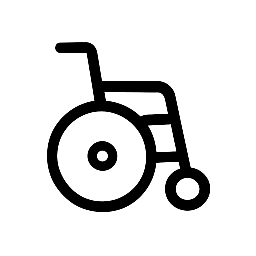
Peace lilies are known for their resilience. They can survive even with neglect, a quality I find deeply symbolic. Just as these plants purify the air, I hope this blog series can cleanse the narrative around true crime, focusing on the real lives and experiences of victims with disabilities, and perhaps serve as a cautionary tale.
My fascination with true crime, while partially fueled by documentaries and Court TV, stems from a more personal place: my own experiences with abuse and neglect. My biological mother, struggling with the trauma of her own difficult childhood, turned to alcohol. Around 1985, she met “The Big Bad Wolf,” as I’ll call him, and our lives changed.
My childhood memories are a mix of Saturday nights watching “Cops” with my brother and the sounds of my mother and “The Big Bad Wolf” returning home drunk. Arguments over money and drinks often escalated into physical violence, with my mother on the receiving end. I remember sitting in my wheelchair, terrified, as police officers – my childhood superheroes – took him to jail, only for him to return the next day, the cycle of abuse continuing. He would apologize, blaming my mother, but the abuse persisted. Back then, in the ’80s and early ’90s, domestic violence laws weren’t what they are today. Often, abusers would spend a night in jail and be released the next day, perpetuating the cycle of abuse. Thankfully, laws have evolved significantly since then, offering greater protection to victims and holding abusers more accountable. For a better understanding of how societal norms have changed relating to domestic violence, click here.
A few memories that I have as a child with a disability and abuse stand out. I had a beloved Fisher-Price tea set, a yellow, white, and blue kettle that whistled. One evening, while playing with it, “The Big Bad Wolf” told me to stop. I was probably five or six, and, like most kids, I tested the boundaries. After a couple more whistles, he threw his heavy work boot, hitting me in the eye. My mother, instead of revealing the truth, told my step-grandfather, a doctor, that I had fallen out of my wheelchair. The lie hung heavy in the air, a testament to the fear that kept us silent. The faint scar I still carry is a reminder of that day.
My cerebral palsy made everyday tasks challenging. One of the biggest struggles was using the bathroom. I often had accidents, and my mother, perhaps due to the stress of her situation, sometimes reacted with impatience. One time, around age nine, I had an accident in bed. “The Big Bad Wolf” responded by slapping me, leaving me seeing stars.
Another time, I had an accident in my stroller while my mother was checking the mail. She rolled me into a spare bedroom, kicking the stroller, where I tipped backward in the stroller, in and leaving me to sit in there by myself, with the door closed.
These are just a few glimpses into my childhood. I could share more, but my intention isn’t to dwell on the details. I want to convey the impact of living with a disability while experiencing abuse. I loved my mother, and I remember the times she tried. I understand now that her struggles with alcohol and the abuse she endured contributed to her behavior.
I refer to her as my “biological mother” because I was eventually placed in foster care due to her alcoholism.
I share my story because I believe it’s essential to connect with others who have experienced similar situations. I want to give a voice to the voiceless, to advocate for others with disabilities who have suffered abuse. Only by sharing our stories can we truly understand and address these issues.
Like the peace lily, I’ve learned to adapt and thrive despite the challenges. I’ve found resilience, a strength that allows me to bloom even in difficult circumstances. Through “Wheelchair Detective,” I hope to spread peace, understanding, and hope.
My voice, my story, and my advocacy will continue to reach out, offering a message of resilience, justice, and unwavering hope. You have a voice. Fight for yourself. Stand up for yourself. You deserve better. Don’t let others define you. Prove them wrong. Join me in giving a voice to the voiceless.



Leave a Reply